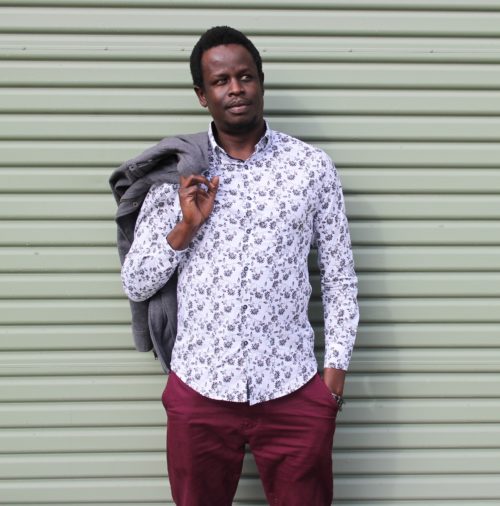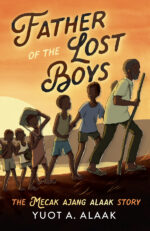Yuot A. Alaak’s memoir about his formidable journey across multiple countries to the relative safety of a refugee camp is now available for younger readers

Children’s publisher Cate Sutherland says, ‘When we first shortlisted Father of the Lost Boys for the City of Fremantle Hungerford Award, we didn’t know then what we know now – that the book would be embraced by readers and that working with Yuot would be such a delight. Both are great reasons for us to bring the work to younger readers. The other is the impactful way real stories like this one engender empathy and connection among the Australian community. We hope you enjoy this interview with the author.’
Describe your book in your own words.
Father of the Lost Boys for Younger Readers tells the story of my family, and especially my dad, Mecak Ajang Alaak, who led almost 20,000 unaccompanied minors out of danger during Africa’s longest civil war. It is an eyewitness account by me, who trained as a child soldier and walked by my father’s side, clutching an AK-47 as I slept next to him.
Before taking on his central role with the now-famous Lost Boys of Sudan, Dad was a prominent educator imprisoned by a government that served its own propaganda interests by announcing his death over the radio. We conducted his funeral, only to discover he was still alive. Dad returned to a hero’s welcome, and to one of the most challenging tasks imaginable.
The story follows the Lost Boys as they journey through rainforests, savannah and desert to escape war and devastation. I saw my father at times of immense stress, but also witnessed his determination to guide the Lost Boys towards a brighter future. Although many succumbed to starvation and thirst, drowned in treacherous rivers, or died as the result of aerial bombardments, landmine explosions, gunshot wounds and wild animal attacks, the majority of the Lost Boys survived. Their story is of global significance and has featured on the BBC, CNN and The Oprah Winfrey Show. But Dad’s remarkable story as leader, teacher and father of the Lost Boys has never previously been told, until now.
Why was it important to you to publish a new edition of your book for young readers?
I think it is important that young readers understand that they live in a global village. I want them to understand that their past doesn’t have to determine their future. I want them to also learn to appreciate the great things they have in life and how lucky we all are to be living in this great country. Also, in all the talks I’ve done, almost every parent told me they wanted their children to read it. I am glad we are fulfilling their wishes.
What do you hope younger readers will get out of the book?
In one word, resilience! To have faith and hope in the face of adversity. And that no matter how bad things are today, they can be better tomorrow. I hope they can have empathy for those less fortunate, like I was all those years ago.
The book is being officially released during refugee week and the theme this year is ‘Finding Freedom: Family’. What does the week mean to you?
I think this is an important week to honour and celebrate all refugees and the great contributions they make to our communities. I think my family is a good example of the positive contributions refugees can make. It is important to understand that no one becomes a refugee by choice. I was touched when I spoke to a young refugee couple from Ukraine a few months ago, who told me they were inspired by my book and that it gave them hope that if they work hard, they can build a new life in Australia and become successful and part of the Australian family. More information about Refugee Week is available here.
What inspired you to write it?
Maya Angelou! Her words, “There is no greater agony than bearing an untold story inside you” rang true to me. I wrote this story to free myself of that agony. I’ve refused to let my past define my future, but I think this is an important story and I believe it will resonate with many of my fellow Aussies – many of whom have their own migrant stories, dating as far back as 1788 or as early as yesterday.
How long did you work on it?
I’ve been wanting to write this story for what seems like an eternity, but the actual writing process took place across twelve to eighteen months. My romantic fantasies about the writing process have since been thrown out the door. Writing is quite a slog, but the joy of seeing a story come to life far outweighs any pain, which for me was quite emotionally draining at times.
What did it mean to you to make the shortlist of the 2018 City of Fremantle Hungerford Awards for your adult manuscript?
It meant a great deal and was beyond my wildest dreams! I sent in my manuscript knowing the chances of making the shortlist were pretty much non-existent, but I used the submission deadline as motivation to keep writing. I’ve grown up hearing “Maaate! You’ve got to be in it to win it”, so I submitted and I was super stoked to make the shortlist.
Father of the Lost Boys for Younger Readers is available in all good bookstores and online. Teaching notes and a free activity for classrooms can be downloaded too.



